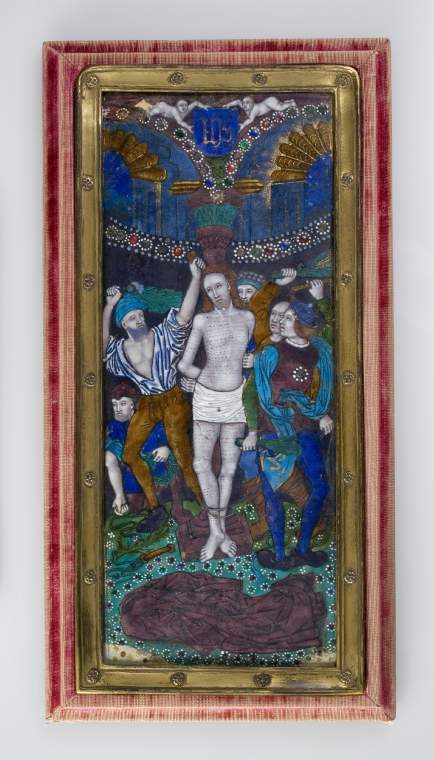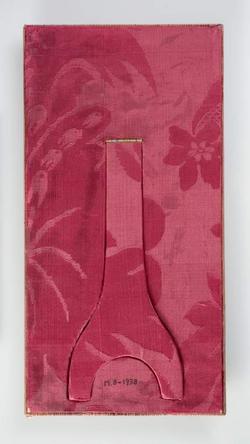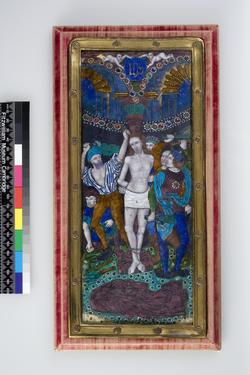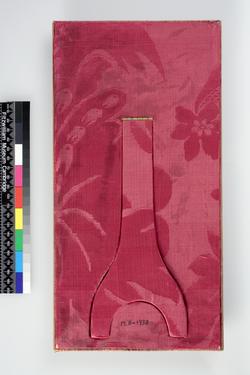Current Location: In storage
Titles
The Flagellation
Maker(s)
Maker:
workshop of Nardon Penicaud
Maker:
Penicaud, Nardon
Printmaker:
Schongauer, Martin
(After)
Entities
Categories
Description
Copper decorated with polychrome enamels, jewelling, and gilding. The Flagellation of Christ by a group of tormentors. Above the architectural background a pair of putti hold up a shield bearing the initials IHS
Rectangular copper plaque with drawing in black over a white ground covered with translucent blue, turquoise, green, tan, and mulberry enamels, opaque red, white, and black enamels; blue, red, and green enamel jewelling over presumed silver foils, and gilding. The counter enamel is a semi-translucent, unevenly dappled dark brown, with many tiny raised dots, and several large corrosion craters. Christ stands in the centre tied with his arms behind his back to a mulberry column. He is naked except for a white loin cloth and his arms, torso and legs are covered with horizontal lines of drops of blood. His mulberry-coloured cloak lies in the foreground on greensward scattered with numerous flowers with red and green jewelled centres and white dotted petals. Two men on the right and one on the left stand with their arms raised holding bunches of green twigs with which they are about to strike Christ. Another man kneels on the left holding a snaking cord in his right hand and a crown of thorns in his left. The head of another is visible behind the column. Above the figures there is a black drape bordered by a curved line of red, blue and green jewels with white dotted edges. Above it, two fluted arches with jewelled edges spring from the green capital of the column. In the spandrel between them is a green mask, and a blue shield bearing the mnogram IHS in gothic letters, held up by two putti who lie horizontally on the top of the arches. Remnants of lavish gilding are visible on the figures and arches. The narrow gilt-metal inner frame has eighteen flower headed rivets. The outer frame of the stand is covered in very worn crimson velvet and is backed by crimson damask with a hinged prop in the middle.
Notes
History note: Sir Francis Cook Bart. (1817-1901); Wyndham Francis Cook (1860–1905); Humphrey Wyndham Cook (1893–1978); sold Christie’s, 7-10 July 1925, Catalogue of an important collection of objects of art of the Middle Ages and Renaissance, the property of Humphrey W. Cook, Esq., and removed from 8 Cadogan Square, S.W., Being a portion of the Celebrated Collection formed by the late Sir Francis Cook, Bart., 2nd Day, 8 July, p. 47, first part of lot 205, described as framed but illustrated unframed; L.D. Cunliffe (1860–1937).
Legal notes
L.D. Cunliffe Bequest, 1937
Acquisition and important dates
Method of acquisition: Bequeathed
(1938)
by
Cunliffe, Leonard Daneham
Dating
16th Century, Early
Circa
1515
CE
-
1525
CE
Note
This Flagellation and its companion plaque of the Crowning of Christ with Thorns (M.9-1938) probably formed the left and right wings of a triptych with the Crucifixion in the centre, as these subjects do on an example in the Museo Sacro Vaticano in Rome. The figures and garment in the foreground were derived from a print in a series of twelve illustrating the Passion of Christ by Martin Schongauer (c. 1441-1491), or from a copy after it. (See Documentation, Bartsch and Hollstein). The architectural setting was omitted, and the figures were depicted in more static and less muscular style. The man at the front of the group on the right follows the print in having his feet and legs facing away from the viewer, but the enameller has created a torso and head facing the viewer.
The plaque was attributed to the workshop of Nardon Penicaud on its accession. The treatment of the draping of Christ’s loin cloth and the jewelled flowerheads on this plaque are very close in style to those on the Crucifixion plaque signed by Nardon Pénicaud and dated 1503 (Musée de Cluny, Paris), but although the faces of the figures have similarly long noses, they are treated with greater realism, which suggests that the plaque was made some years later. The triptych in the Museo Sacro Vaticano is also attributed to Nardon Pénicaud. There is very little deterioration of the blues and manganese-purples, which suggests that it was made later than the Deposition (MAR.M.250-1912) which has considerable degrading of the manganese-purples, probably in the 1520s.
The metal frame and red velvet-covered mount are typical of French 19th century mounting of painted enamels. The scarlet damask backing and prop could have been made for it while it was in Leonard D. Cunliffe's collection or possibly, after it entered the Fitzwilliam's collection.
School or Style
Renaissance
People, subjects and objects depicted
Components of the work
Decoration
composed of
enamel
( translucent blue, turquoise, green, tan, and mulberry opaque red, white, and black)
gold
Plaque
composed of
copper
Height 28.5 cm
Width 11.5 cm
Foils
composed of
silver
Inner Frame
Height 30.8 cm
Width 14 cm
Outer Frame
Height 34 cm
Width 17.5 cm
Front
Inscription or legends present
Inscription present: in gothic letters
- Text: IHS
- Location: On blue shield in spandrel between arches
- Method of creation: Painted in gold
- Type: Inscription
References and bibliographic entries
Identification numbers
Accession number: M.8-1938
Primary reference Number: 139848
Inventory number: B39
Stable URI
Audit data
Created: Saturday 6 August 2011
Updated: Tuesday 11 February 2025
Last processed: Thursday 14 August 2025
Associated departments & institutions
Owner or interested party:
The Fitzwilliam Museum
Associated department:
Applied Arts

 IIIF Manifest
IIIF Manifest






